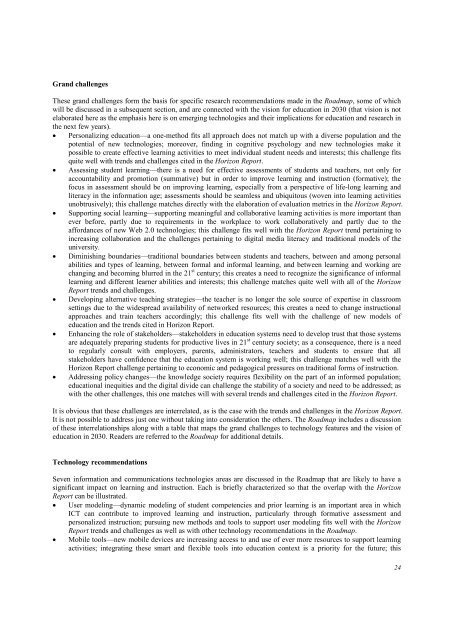Download Complete Issue in PDF - Educational Technology & Society
Download Complete Issue in PDF - Educational Technology & Society
Download Complete Issue in PDF - Educational Technology & Society
You also want an ePaper? Increase the reach of your titles
YUMPU automatically turns print PDFs into web optimized ePapers that Google loves.
Grand challenges<br />
These grand challenges form the basis for specific research recommendations made <strong>in</strong> the Roadmap, some of which<br />
will be discussed <strong>in</strong> a subsequent section, and are connected with the vision for education <strong>in</strong> 2030 (that vision is not<br />
elaborated here as the emphasis here is on emerg<strong>in</strong>g technologies and their implications for education and research <strong>in</strong><br />
the next few years).<br />
• Personaliz<strong>in</strong>g education—a one-method fits all approach does not match up with a diverse population and the<br />
potential of new technologies; moreover, f<strong>in</strong>d<strong>in</strong>g <strong>in</strong> cognitive psychology and new technologies make it<br />
possible to create effective learn<strong>in</strong>g activities to meet <strong>in</strong>dividual student needs and <strong>in</strong>terests; this challenge fits<br />
quite well with trends and challenges cited <strong>in</strong> the Horizon Report.<br />
• Assess<strong>in</strong>g student learn<strong>in</strong>g—there is a need for effective assessments of students and teachers, not only for<br />
accountability and promotion (summative) but <strong>in</strong> order to improve learn<strong>in</strong>g and <strong>in</strong>struction (formative); the<br />
focus <strong>in</strong> assessment should be on improv<strong>in</strong>g learn<strong>in</strong>g, especially from a perspective of life-long learn<strong>in</strong>g and<br />
literacy <strong>in</strong> the <strong>in</strong>formation age; assessments should be seamless and ubiquitous (woven <strong>in</strong>to learn<strong>in</strong>g activities<br />
unobtrusively); this challenge matches directly with the elaboration of evaluation metrics <strong>in</strong> the Horizon Report.<br />
• Support<strong>in</strong>g social learn<strong>in</strong>g—support<strong>in</strong>g mean<strong>in</strong>gful and collaborative learn<strong>in</strong>g activities is more important than<br />
ever before, partly due to requirements <strong>in</strong> the workplace to work collaboratively and partly due to the<br />
affordances of new Web 2.0 technologies; this challenge fits well with the Horizon Report trend perta<strong>in</strong><strong>in</strong>g to<br />
<strong>in</strong>creas<strong>in</strong>g collaboration and the challenges perta<strong>in</strong><strong>in</strong>g to digital media literacy and traditional models of the<br />
university.<br />
• Dim<strong>in</strong>ish<strong>in</strong>g boundaries—traditional boundaries between students and teachers, between and among personal<br />
abilities and types of learn<strong>in</strong>g, between formal and <strong>in</strong>formal learn<strong>in</strong>g, and between learn<strong>in</strong>g and work<strong>in</strong>g are<br />
chang<strong>in</strong>g and becom<strong>in</strong>g blurred <strong>in</strong> the 21 st century; this creates a need to recognize the significance of <strong>in</strong>formal<br />
learn<strong>in</strong>g and different learner abilities and <strong>in</strong>terests; this challenge matches quite well with all of the Horizon<br />
Report trends and challenges.<br />
• Develop<strong>in</strong>g alternative teach<strong>in</strong>g strategies—the teacher is no longer the sole source of expertise <strong>in</strong> classroom<br />
sett<strong>in</strong>gs due to the widespread availability of networked resources; this creates a need to change <strong>in</strong>structional<br />
approaches and tra<strong>in</strong> teachers accord<strong>in</strong>gly; this challenge fits well with the challenge of new models of<br />
education and the trends cited <strong>in</strong> Horizon Report.<br />
• Enhanc<strong>in</strong>g the role of stakeholders—stakeholders <strong>in</strong> education systems need to develop trust that those systems<br />
are adequately prepar<strong>in</strong>g students for productive lives <strong>in</strong> 21 st century society; as a consequence, there is a need<br />
to regularly consult with employers, parents, adm<strong>in</strong>istrators, teachers and students to ensure that all<br />
stakeholders have confidence that the education system is work<strong>in</strong>g well; this challenge matches well with the<br />
Horizon Report challenge perta<strong>in</strong><strong>in</strong>g to economic and pedagogical pressures on traditional forms of <strong>in</strong>struction.<br />
• Address<strong>in</strong>g policy changes—the knowledge society requires flexibility on the part of an <strong>in</strong>formed population;<br />
educational <strong>in</strong>equities and the digital divide can challenge the stability of a society and need to be addressed; as<br />
with the other challenges, this one matches will with several trends and challenges cited <strong>in</strong> the Horizon Report.<br />
It is obvious that these challenges are <strong>in</strong>terrelated, as is the case with the trends and challenges <strong>in</strong> the Horizon Report.<br />
It is not possible to address just one without tak<strong>in</strong>g <strong>in</strong>to consideration the others. The Roadmap <strong>in</strong>cludes a discussion<br />
of these <strong>in</strong>terrelationships along with a table that maps the grand challenges to technology features and the vision of<br />
education <strong>in</strong> 2030. Readers are referred to the Roadmap for additional details.<br />
<strong>Technology</strong> recommendations<br />
Seven <strong>in</strong>formation and communications technologies areas are discussed <strong>in</strong> the Roadmap that are likely to have a<br />
significant impact on learn<strong>in</strong>g and <strong>in</strong>struction. Each is briefly characterized so that the overlap with the Horizon<br />
Report can be illustrated.<br />
• User model<strong>in</strong>g—dynamic model<strong>in</strong>g of student competencies and prior learn<strong>in</strong>g is an important area <strong>in</strong> which<br />
ICT can contribute to improved learn<strong>in</strong>g and <strong>in</strong>struction, particularly through formative assessment and<br />
personalized <strong>in</strong>struction; pursu<strong>in</strong>g new methods and tools to support user model<strong>in</strong>g fits well with the Horizon<br />
Report trends and challenges as well as with other technology recommendations <strong>in</strong> the Roadmap.<br />
• Mobile tools—new mobile devices are <strong>in</strong>creas<strong>in</strong>g access to and use of ever more resources to support learn<strong>in</strong>g<br />
activities; <strong>in</strong>tegrat<strong>in</strong>g these smart and flexible tools <strong>in</strong>to education context is a priority for the future; this<br />
24

















